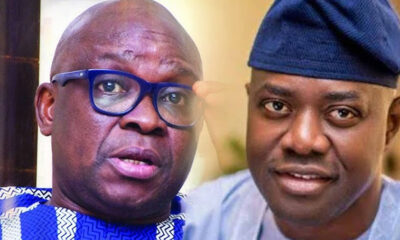Opinion
Intimate affairs: The juicy power of the other room – Funke Egbemode

Intimate affairs: The juicy power of the other room – Funke Egbemode
The other room is the most important room in the home and in any woman’s life. Every woman knows that. So, don’t mind those who are pretending to be holier than the sacred sanctuary. It’s okay to have powers in and over the other rooms, but a woman who does not know how to wield the influence derivable and derived from the other room is indeed a powerless woman.
Yes, the power of the boardroom is plenty power. But what is the power of the boardroom without the power of the bedroom? At best, the power of the boardroom is transient. It is power that can be wrested from your hands in one board meeting. It is power you can be suspended or retired from. Without your entitlements too! But the real influence of the other room is sweet, and long-lasting. Even when a woman gets promoted to the position of a first wife, she only shares that power with the new entrant, she does not have to relinquish it altogether. There would still be things the new wife will not happen on or know just because she knows how to apply her make-up. A woman who has lived with her man for 20 straight years most certainly knows where all the buttons are on that body and how to insert the right keys to open the right doors. A new wife, yes, knows how to manipulate current ring-back tunes and his caller tunes because the man was sneaking in at weekends to chop-and-clean-mouth, it is still the licensed owner of the other room who knows how to wake the giant up from the deepest slumber. But let’s not wait too long at that bus stop.
Moving on, every woman must know and use the power of the other room. It is the power you hold tightly, girls. You sit tight on it. It is not democratic power. It is monarchical. You hold on to it until death do you part. Oh yes.
A friend once told me how she used to do extra duty on her husband any time he announced he was going to be working late or going for a management retreat out of town. She would do an all-nighter in the other room. She would coax him up and ensure he gave a good account of himself the night before. Then she would ice the cake with a long-drawn-out dawn work-out in the morning and then let him leave the other room, spent and thoroughly used. She knew ‘bros’ was a strong man but when a man has been thoroughly dealt with at night and in the morning, the ‘conference materials’ will have to do more than struggle to wake the giant up. Right. If you ask me, every wife of every busy man should give their men a good work-out in the other room to ensure the guys have less wild oats to sow. Get some of the juice for yourself. How smart can you claim to be if you clean a gun for hours, load it with bullets, cock it and then you let him go shoot it somewhere else? Babe, you are all the shooting range he needs. Let him practise all he wants in the other room.
READ ALSO:
- EFCC arraigns two for alleged N35 million fraud in Enugu
- Police arrest eight suspected robbers on wanted list
- Tinubu’s removal of subsidy spurred by ‘sheer arrogance’ – Babachir Lawal
Talking about shooting range, too many women voluntarily retire from the other room and still expect to continue to wield influence over ‘oga’. It does not make sense. You are either in the other room or you are outside it. No woman can stay outside that powerful room and remain powerful. That is why I said that this matter is not a democracy. You have no term or tenure. Play your politics right and stay put. Do whatever you need to do. It is a war and all is fair in war. Play fair only when it suits you. When you need to go the extra mile to keep your place and ‘oga’ in the other room, plaster a designer smile on your face and do what you need to do. Just remind yourself of your wedding vows and what the holy books say…
But is the other room the only room of influence? Some say the kitchen is also important. They underscore that with one suspicious saying: the best way to a man’s heart is through the stomach. Seriously? I do not buy that line. Fine, they told us all kinds of things when we were getting married but the things we have all learnt on the job are unquantifiable. Who drew the map that linked the stomach of a man to his heart? Let us be sincere, that kind of road network is suspect. What kind of geography is that? And if you still doubt that kitchen theory, ask why wives, women employ cooks and house-helps for the kitchen and no woman wants to be helped in the other room. Ah ah, my point exactly. The superior room is the other room. Everybody is welcome in the kitchen. The other room? No.
A lot of work, of course, goes into keeping your space in the other room. Plenty of sweat and long nights. No woman should let all that go to waste, after all, the bible said that we shall eat the fruit of our labour. Whatever cannot be fixed in the other rooms must find solution in the other room. Whatever a babe can’t fix through her man’s stomach, she must fix behind closed doors. Whatever argument a woman can’t win with long logic in the living room, she must take to the other room for final adjudication. You see, it is in that room, only in the other room, that a woman gets to play judge and jury. It is one place where a woman can baptise her husband, pray for him and God watches you both and clap and smile and say, well done, my daughter. See how divinely appointed the other room is!
READ ALSO:
- Trump wins South Carolina primary, defeating Haley in her home state
- Bodija Explosion: Why there is delay in extraditing indicted Malians – Makinde
- Why we lifted sanctions on Niger Republic, Mali, Burkina Faso- ECOWAS
From the choice of which schools a woman wants the children to attend, to where she wants him to acquire property and holiday destinations, a little extra work in the other room can lessen the hours spent on arguments. Being extra nice to your man in the other room, if you get my meaning, will make his cantankerous sister less influential. Paying more attention to his sensitive buttons will make him less antagonistic to your Christmas budget. New tricks, new techniques may work better when you want more housekeeping allowance than the logic of falling naira and rising dollars.
But I must warn that the other room is a room of strategy that must be used strategically. It is a room you can enjoy every day but the powers therein must be deployed strategically and with tons of wisdom otherwise the advantage will be lost. If the power in this room is not handled smartly and intelligently, it may be misinterpreted as blackmail. A man must not be deprived of what he paid for, even if he paid in instalments. You cannot withhold from him his entitlements. Just rev it up, keep it warm and some times, serve it so hot he begins to speak a foreign language.
Whatever you do, never ever forget that the other room is the most superior room and that only smart women know how to deploy the power therein.
Intimate affairs: The juicy power of the other room – Funke Egbemode
…Funke Egbemode can be reached through her e-mail: [email protected]
Opinion
How a Misleading Channels TV Headline Reignited Nigeria’s Religious Tensions

How a Misleading Channels TV Headline Reignited Nigeria’s Religious Tensions
In Southwestern Nigeria, the historic heartland of the Yoruba ethnic group, religious coexistence was once deeply ingrained in everyday life. Families were often religiously heterogeneous yet harmonious: a Muslim husband with a Christian wife, parents of different faiths raising children who chose Islam, Christianity or indigenous beliefs. Religious festivals were commonly celebrated together, reinforcing social cohesion.
This tradition of harmony began to erode significantly after the introduction of the Structural Adjustment Programme (SAP) in 1986 by the military government of General Ibrahim Badamasi Babangida, under the influence of the World Bank and the International Monetary Fund (IMF). SAP policies—such as reduced government spending on education and social services, trade liberalisation and currency devaluation—triggered soaring inflation, weakened purchasing power and widespread economic hardship.
As livelihoods collapsed, some Nigerians turned to corrupt practices, while others found opportunity in the rise of commercialised religious enterprises, complete with aggressive business models and intense competition for followers. This shift contributed to rising intra- and inter-religious tensions, particularly in a region once celebrated for tolerance.
The erosion of harmony in the Southwest mirrored growing religious conflicts across Nigeria, especially between Christians and Muslims. Scholars and analysts have long warned that the media plays a decisive role in either escalating or de-escalating such conflicts. In his 2006 pamphlet Voices of War: Conflict and the Role of the Media, Andrew Puddephatt observed that media outlets can either inflame violence through partisan reporting or promote peace through independence and responsible framing.
READ ALSO:
- Carter Efe Slams Peller’s Suicide Attempt, Urges Him Back to Streaming After Jarvis Breakup
- Breaking: Popular Nigerian Actress Allwell Ademola Dies at 43
- Labour Party Urges Tinubu to Sign Executive Order on Local Government Autonomy
These concerns resurfaced sharply on 24 December 2025, when a mosque in Maiduguri, Borno State, was bombed during Maghrib prayers, killing worshippers. International and local media clearly identified the target as a mosque. Headlines from BBC, Al Jazeera, Deutsche Welle, The Cable, The Guardian (Nigeria) and Daily Trust all referenced the mosque or Muslim worshippers.
However, Channels Television published the headline: “BREAKING: Many feared dead as bomb blast rocks Maiduguri on Christmas eve.” The omission of the mosque and the emphasis on “Christmas Eve” drew widespread criticism for being misleading and inflammatory.
Reacting on X, commentator Boss Kitty Kitty (@Aashfinn) condemned the framing, warning that it fed a dangerous “Christian genocide” narrative, despite evidence that terrorism in Nigeria targets victims indiscriminately. The Muslim Public Affairs Centre (MPAC) also issued a strong statement, accusing Channels Television of editorial bias, deliberate omission of Muslim identity, and the weaponisation of language to provoke religious tension.
MPAC argued that the headline change—adding “Christmas Eve” after initial publication—suggested a calculated attempt to drive engagement at the expense of national unity. The organisation further alleged a pattern in which Muslim victims are anonymised while narratives that heighten suspicion against Islam are amplified.
Media scholars describe this practice as media bias and confirmation bias, where editorial choices reinforce preconceived narratives while excluding crucial context. Studies consistently show that headlines shape public perception, especially in an era where many readers share stories based solely on headlines without reading full reports.
The controversy came just a day after President Bola Ahmed Tinubu, in his Christmas Day 2025 broadcast, reaffirmed the government’s commitment to religious freedom, protection of all faiths, and peaceful coexistence. While the President sought to calm tensions and promote dialogue, critics argue that irresponsible media framing risks undermining these efforts.
As one commentator, @mrabdulreacts, noted on TikTok: “Narratives can be more dangerous than bullets… misleading headlines can destroy trust for generations.” The Maiduguri bombing coverage has therefore reignited urgent questions about journalistic responsibility, religious sensitivity, and whether sections of the Nigerian media are contributing to division in an already fragile society.
How a Misleading Channels TV Headline Reignited Nigeria’s Religious Tensions
Opinion
When a Tax Law is an illegality, By Farooq Kperogi

When a Tax Law is an illegality, By Farooq Kperogi
What began as a routine legislative reform of the Nigerian tax system by the Bola Tinubu administration has transmogrified and metastasized into an allegation of unexampled transmutation of a duly passed law to an illegality.
It’s by now well known that a law passed by the National Assembly and assented to by the president may have been materially altered after assent and then presented to the public as binding law. If this allegation is established beyond all shadows of doubt, Nigeria would be confronting the specter of an illegality fraudulently constituted as law.
Interestingly, the discovery wasn’t brought to public notice by secretive, conscientious whistleblowers in the bureaucracy or from eagle-eyed civil society audits. It came from within the legislature itself.
A member of the House of Representatives, Abdulsammad Dasuki, raised a point of privilege after personally comparing the harmonized bill passed by both chambers with the version of the tax laws published in the official gazette. He found that the documents did not match.
His discovery was the product of days of rigorous, studious and painstaking examination of Votes and Proceedings, committee harmonization records and the gazetted text. He realized that he voted for one thing, but the country was being governed by another.
That intervention sparked a chain reaction. Other lawmakers requested certified true copies of the assented bill to verify whether the president had signed the same text that was now in circulation. According to multiple reports, those requests were denied.
The refusal to release certified copies deepened suspicion and transformed what could have been dismissed as a clerical misunderstanding into a full-blown institutional crisis.
When legislators are blocked from seeing the law that they passed and that the president signed, the issue verges on criminal constitutional transgression that must not be swept under the carpet.
While full official disclosure is still pending, several discrepancies have been repeatedly cited by lawmakers, journalists and civil society groups. These include expansions of the discretionary powers of tax authorities beyond what the National Assembly approved, alterations to reporting and oversight obligations, changes in enforcement thresholds, and adjustments that potentially increase executive control over revenue administration.
READ ALSO:
- AFCON 2025: Mali Fight Back to Draw With Hosts Morocco in Rabat
- AFCON 2025: Salah’s Spot Kick Seals Egypt’s Knockout Spot Against South Africa
- 2026 World Cup: FIFA Throws Out Nigeria’s Appeal Against DR Congo
These are not innocent, unintentional clerical slips. They go to the meaning, scope and intent of the law. In short, they change who has power to tax Nigerians, how that power is exercised and to whom it is accountable.
The distinction matters. All legislative systems experience clerical errors. A misplaced word or a misnumbered section does not invalidate a statute. But when alterations confer new powers, remove safeguards, or shift institutional balance, they cross from error into illegality.
A gazette cannot lawfully create what the legislature did not enact or what the president did not assent to. Publication is supposed to merely provide evidence of the existence of the law. It can invent a law that hasn’t been passed.
The official responses so far have been evasive and contradictory. Government representatives initially insisted that there was only one authentic version of the law and that claims of alteration were partisan, ill-natured rumors. But that posture is difficult to reconcile with subsequent developments.
For example, a December 26, 2025, press statement signed by Akin Rotimi, House Spokesman and Chairman of the House Committee on Media and Public Affairs, said the National Assembly has now constituted an ad hoc committee to investigate the sequence of events from harmonization to assent to gazetting.
More tellingly, Rotimi said, the leadership of the legislature has directed that the tax laws be re-gazetted and that certified true copies of the versions duly passed by both chambers be issued.
Re-gazetting is not a neutral act. It is an implicit admission that the existing gazette cannot be confidently treated as an accurate record of legislative intent. If nothing were amiss, there would be nothing to authenticate. The attempt to frame this as a routine administrative clarification rings hollow. Laws are not re-gazetted in the absence of doubt about their authenticity.
Supporters of the government have urged the public to trust the president’s integrity and to avoid speculation. The issue, however, is not whether the president is personally trustworthy but whether the law now being enforced is the law he signed. No amount of rhetorical reassurance can substitute for producing the signed text and allowing a side-by-side comparison with the gazetted version.
There is no precedent in the world that I have found for this kind of illegality. In the United States, the much-cited Deficit Reduction Act controversy of 2006 involved a discrepancy between House and Senate versions due to a clerical transmission error. The president signed the enrolled bill that was presented to him.
Courts upheld it under the enrolled bill doctrine, which treats the signed text as conclusive. Crucially, there was no claim that the law was altered after presidential assent.
READ ALSO:
- Cancer Patient Appeals for Second Wife for Husband, Cites Sexual, Health Challenges
- ACF Awaits Full Details Before Commenting on US–Nigeria Airstrikes in Sokoto
- FG Confirms Debris from US–Nigeria Joint Airstrikes on ISIS in Sokoto Fell in Offa
In the Philippines, in 1964, there was a case where the wrong version of a bill was signed by the president. Legislative leaders later disowned the enrolled copy and treated the signature as invalid. Again, the error occurred before or at assent, not after. Once discovered, it was confronted as a mistake. It wasn’t normalized.
Nigeria’s case, if the allegations are borne out, is more disturbing. Here, the claim is that the president signed the correct bill but that the authoritative law published afterward materially departs from it.
Comparative constitutional practice offers no comfort here. Stable legal systems do not recognize post-assent textual mutation as valid law. Where gazetting errors occur, they are corrected. They do not become the basis for enforcement.
This raises an unavoidable question: why would anyone alter a law after it has been passed and signed? Motives can only be inferred from circumstantial evidence, but the inferences are troubling.
Expanding the powers of tax authorities in a period of fiscal stress creates incentives for bureaucratic overreach. Removing or weakening legislative-oversight provisions reduces accountability. Centralizing discretion in the executive arm simplifies revenue extraction while insulating decision makers from scrutiny. These are not abstract possibilities. They align closely with the specific alterations that have been alleged.
There is an even more unsettling implication. If a major tax reform law can be altered after assent without immediate detection, what confidence can citizens have in the integrity of other statutes? Nigeria has passed hundreds of laws over the years, many of them technical, complex and rarely scrutinized line by line after gazetting. The discovery of this discrepancy raises the chilling possibility that post-assent alterations may not be unprecedented in practice.
That possibility should alarm every Nigerian regardless of political affiliation. Law is the foundation of collective life. If the text of the law is unstable, if it can be surreptitiously modified after constitutional procedures have been completed, then legality itself becomes provisional. Governance slides from rule of law to rule by document manipulation.
The seriousness of this violation cannot be overstated. If officials altered the tax law knowingly, they did not merely breach administrative rules. They subverted the Constitution. Such conduct would amount to forgery, abuse of office and an assault on democratic sovereignty. It would mean that Nigerians are being taxed under provisions that were never lawfully enacted.
This is why a thorough, transparent investigation is not optional. It must establish a clear documentary chain: the harmonized bill passed by both chambers, the exact text transmitted for assent, the document signed by the president and the version published in the gazette. Any divergence must be accounted for, step by step, with named responsibility. Institutional reviews that end in vague recommendations will not suffice.
If culpability is established, punishment must be severe. Anything less would invite repetition. As I always say, there is no greater enabler of habitual relapses into the same crime than the absence of consequences for committing the crimes.
The alteration of law after assent is not a victimless bureaucratic shortcut. It is a constitutional crime with nationwide consequences. Deterrence requires more than quiet corrections. It requires accountability that is visible, proportionate and unmistakable.
This episode can either be buried under procedural language and political loyalty, or it can become a moment of constitutional self-correction. A tax law that is an illegality cannot be the foundation of fiscal reform. The integrity of the lawmaking process is itself a public good. Without it, no reform, however well intentioned, can claim legitimacy.
When a Tax Law is an illegality, By Farooq Kperogi
Kperogi is a renowned columnist and United States-based Professor of Journalism
Opinion
Experts Warn US Strikes in Nigeria Could Harm Civilians, Fuel Sectarian Tensions

Experts Warn US Strikes in Nigeria Could Harm Civilians, Fuel Sectarian Tensions
Security analysts and local observers have raised concerns over the recent United States military strikes in Nigeria, warning that the operations could misfire and exacerbate tensions rather than curb terrorism.
The strikes, carried out in Sokoto State on Christmas Day under the guise of counterterrorism, mark the first US military operation on Nigerian soil in modern history. The action follows repeated claims by former US President Donald Trump, who alleged a “Christian genocide” in Nigeria and threatened military intervention.
According to eyewitnesses, the areas targeted have no established history of terrorist or bandit activity, with some strikes reportedly affecting civilian-populated areas rather than forested hideouts typically associated with terrorist groups like Boko Haram and ISWAP. Analysts warn that this raises questions about intelligence accuracy and operational planning.
READ ALSO:
- Fenerbahçe Move Ahead of Galatasaray in Race to Sign Nigerian Star Ademola Lookman
- Benue Police Foil Christmas Day Kidnap, Rescue Victim Unharmed
- Alleged Alterations Threaten Nigeria’s January Tax Reforms, Lawmakers Call for Suspension
Mallam Ibrahim Agunbiade, writing on the implications of the strikes, emphasized that Nigeria’s security challenges are regionally specific. Boko Haram and ISWAP are concentrated in the North-East, while armed banditry is largely confined to forested regions in Zamfara and Niger states. “Any counterterrorism effort that ignores these realities is either grossly incompetent or deliberately misleading,” he noted.
Experts also caution against framing Nigeria’s crisis as a religious conflict, pointing out that both Muslims and Christians are affected by terrorism. Weaponizing religion to justify foreign military intervention could delegitimize Nigeria’s sovereignty and inflame sectarian tensions.
Agunbiade stressed that the country needs intelligence-driven cooperation and respect for its territorial integrity, rather than indiscriminate bombardments that may increase civilian casualties, deepen resentment, and destabilize communities.
“The goal must be accuracy, accountability, and restraint. Anything less is not counterterrorism; it is a reckless intervention with potentially devastating consequences,” he wrote.
Experts Warn US Strikes in Nigeria Could Harm Civilians, Fuel Sectarian Tensions
-

 Entertainment3 days ago
Entertainment3 days agoBreaking: Popular Nigerian Actress Allwell Ademola Dies at 43
-

 metro2 days ago
metro2 days agoIbadan Explosion: Fayose Releases Documents, Claims Makinde Got ₦50bn from FG
-

 metro1 day ago
metro1 day agoNiger Delta Crackdown: Army Seizes ₦150m Stolen Oil, Arrests 19 Suspects
-

 metro2 days ago
metro2 days agoPlateau Kidnappers Demand ₦1.5m Each as 28 Muslim Travellers Remain in Captivity
-

 Sports1 day ago
Sports1 day agoCristiano Ronaldo Wins Best Middle East Player at 2025 Globe Soccer Awards in Dubai
-

 Opinion2 days ago
Opinion2 days agoHow a Misleading Channels TV Headline Reignited Nigeria’s Religious Tensions
-

 Sports1 day ago
Sports1 day agoAnthony Joshua injured as two die in fatal Lagos-Ibadan Expressway crash (plus photos)
-

 metro2 days ago
metro2 days agoNigerian Army Kills 438 Boko Haram, ISWAP Terrorists in Seven Months



